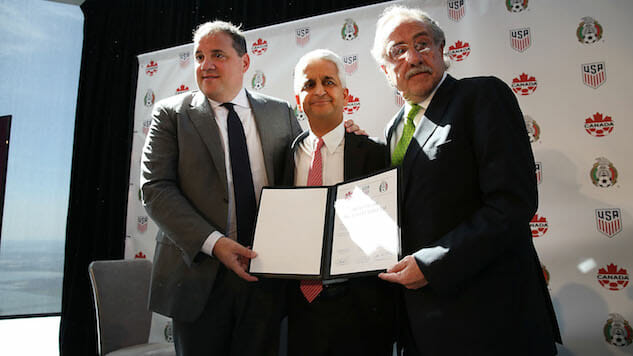FIFA and the False Dawn of the ‘NAFTA World Cup’ Bid Proposal
Photo by Spencer Platt/Getty
When critics warned that FIFA had sold what little was left of its blackened soul by awarding the next two World Cups to Russia and Qatar, it’s likely they had the 2026 World Cup bidding process in mind. Having awarded the event to regimes in competition for the worst human rights, labor rights, and democracy track records, soccer’s governing body would be hard pressed not to find a less problematic host.
How, then, to judge the latest entrants into the World Cup bidding wars?
The United States, which announced its candidacy to host the 2026 World Cup along with Canada and Mexico on Monday, is not Qatar. And despite what certain conspiracy theorists believe, it is also not Russia. However, that alone does not a great World Cup host make.
To wit, Sports Illustrated’s Grant Wahl first reported that the USA is partaking in a joint bid because FIFA demands assurances that fans and players from around the world can actually enter the country. A few hours later, Wahl clarified that US Soccer would have to guarantee access for all countries even if it partook in a joint bid. This, at a minimum, would require a temporary rollback of Donald Trump’s current travel policy, which would otherwise preclude players and fans from nations such as Iran from attending events in the United States.
“We have very specifically addressed this with the president,” US Soccer president Sunil Gulati said at Monday’s launch event. “He is fully supportive of the joint bid, encouraged the joint bid, and is especially pleased with the fact Mexico is participating in the joint bid.” Make of that whatever you will. It seems plausible that Donald Trump might say such a thing in the name of “closing” a deal, but it would be hard to blame FIFA voters for having doubts. Trump’s travel policy may no longer be in place by 2026, but voting on this bid will happen before the next presidential election takes place. For its part, Mexico would be equally hard-pressed to guarantee the equitable treatment of LGBTQ fans in its stadia. FIFA’s voters cannot be asked to blindly trust that such problems will be magically solved in the intervening years.
The sort of compromise US Soccer might reach, as hinted in Wahl’s update, is similar to what’s on the table for the next two World Cups. Russia and Qatar have promised to moderate their policies for the duration of the tournament—even if it’s just lip service. Seeing as FIFA’s operating principle might best be described as the bigotry of low expectations, US Soccer’s greatest advantage in this bid is that it follows two riotously unqualified hosts.
-

-

-

-

-

-

-

-

-

-

-

-

-

-

-

-

-

-

-

-

-

-

-

-

-

-

-

-

-

-

-

-

-

-

-

-

-

-

-

-








































